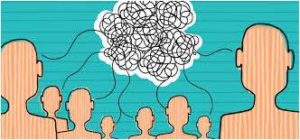People often ask me what is Neuro Linguistic Programming (NLP) which is one of the questions I find most tricky to answer. The only thing I can compare it to is if someone asked you, “what is art”? As with art, NLP has lots of different aspects which shine through depending on what it is being used for, and can come in lots of different forms. There are however, some key principles which can be applied in a multitude of different ways. NLP is currently used in many different fields, such as, business, politics, health services, sport, the armed forces and the film industry to name a few. I thoughts I’d write this blog to give more insight into specifically the Licensed Business Practitioner of NLP, it’s a bit wordy but trust me it’s good. Read on to the end, there’s no big finish but you will hopefully know more after you have digested what I’ve said. I hope you enjoy it!
The Oxford dictionary definition says: Neuro Linguistic Programming “A model of interpersonal communication chiefly concerned with the relationship between successful patterns of behaviour and the subjective experience (especially patterns of thought) underlying them.” “a system of educating people in self-awareness and effective communication, and to teach people how to change their patterns of mental and emotional behaviour”. This is a great explanation which was written by Dr Richard Bandler the Co-Creator of NLP. But what does it mean?
NLP is very simply the study of successful thinking. As all our behaviour is prompted by thought so I suppose we could say it’s a vehicle for successful behaviour too.
Let me explain….
Let’s start at the foundations and work our way up. The reason I say foundation is because I think the key to all of this is to understand how we exist in the world and understand what is going on around us. The first thing we look at on the course is the way our brains encode information and how this then produces our thoughts. I bet your thinking how will that benefit me? But this does give real insight into the fact that we are all different. This to me, when I first studied NLP was very simple concept, but really challenged my thinking, and for the first time really got me to change my view of the world. Safe in the knowledge that it was only my view or “map of the world” we would say in NLP. Once I realised that perception of the world around us is different in every single person it helped me to understand that building relationships, communicating and even presuming what other people’s behaviour meant was going to be tricky, but something open to exploration.
We then move onto rapport and building relationships. With the concept of how different we all are at the back of our minds, we delve into the reasons for our relationships and the best way to go about them. Being able to build and maintain good relationships is one of the most important things to create success in life and definitely a key success in business. If you think of the people you think are most successful, they are often able to build rapport easily and quickly and maintain their relationship with others. This doesn’t mean speaking with or even being in contact with lots of people all the time, but being able to effectively manage all of their interactions and the gaps in between. As part of the Licensed Business Practitioner of NLP we will cover how to develop business relationships to the optimum level in-order to get the best from any situation and also how to build rapport at a deeper level to enable more effective communication.
When I work with businesses of all sizes, one of the most common things that both leaders and colleagues say they need is better communication. I find the common thought here is that they either need more or need less. Just communicating more or even less often is very rarely beneficial, but rather to think about how and when? When we start to think about the different ways people like to be communicated with, including ourselves it’s clear that everyone will prefer a different level of communication and probably like that communication to be delivered in varying ways. There’s never one solution fits all. Within the Licensed Business Practitioner of NLP, you will learn the art of effective communication. Not only to individuals but also larger groups. We will apply it to lots of different scenarios such as, if you’re working with others in a field based environment where colleagues are in lots of different locations, or if you find it difficult to find time to speak on a one to one with your line managers or others in your team regularly. Perhaps you work side by side daily with people you manage or you are being managed by. These are all scenarios to discuss. We’ll also discuss how do your customers know what you’re doing for them, i.e. what do you say and do to reflect your business offering? I’ll share with you some examples of the way I have used communication to ensure your message has maximum success of being received and understood correctly and we will discuss ideas you can use within your working environment. During the programme we will also learn about different ways of communicating from the spoken word, written language and body language. They say that only 7% of the message you give is from what you say, so we will delve into that as well as the other 93%? and how to look for signs from others, to help you understand what they are thinking and how to act appropriately.
As well as communication, we will examine modelling success. This is where we investigate how ourselves and others go about success. Success can be anything from being organised, making good decisions or successfully dealing with pressure or stress for example. No matter where someone is within an organisation its often very common for people to have times when they feel overwhelmed either by workload, time pressures or magnitude of the decisions they must make. During the programme, we look at how others deal with these types of pressures successfully or when we often apply a successful strategy to these types of things, in different context. An example could be someone feeling they have lots to deal with and “everything is on top of them” at work, however at home they often have lots to deal with such as juggling the family with running a household and making sure bills are paid shopping is done and everything and everyone is on time. The way they think about these scenarios are often different. At home, they take each task in order of priority, dealing with that and then moving on to the next task, meanwhile not think about everything at once. They often have a good gauge of how long things take and understand what is an absolute must and what is a nice to do. They will often have a routine which can make things easier and fit in reactive tasks around the routine. By understanding the differences in the strategies and using the successful one within the work scenario e.g. get a routine where possible, understand the tasks you have in terms of their importance and time they take to complete, take one task at a time, focus on the job in hand then move to the next, can really help that individual. (remember this is just an example but may also work for you) Sounds simple but it’s effective. you will learn how you can understand your own thoughts and be more purposeful with your thinking to get the best from yourself or the team around you.
Another aspect of NLP which I have eluded to above is the patterns of thought which dictate our emotional responses and our behaviour. Having more Emotional Intelligence i.e. being able to have more control over your emotions or state and being able to recognise emotions or states in others as well as understanding the impact you have is very useful skill. Imagine if you must enthuse a team to deliver a task under time pressures or to really apply themselves to a challenge. How would you go about it? and how do you know when others are enthused or on board with what you’re asking? Also, what if you have a scenario where you need to be assertive or be empathetic how would you prepare? NLP techniques and understanding can be the answer to all the questions above
The last thing I want to talk about is Goals. Most of us have them whether we think they’re big or small, we often have many different things we want to achieve, need to achieve or would like to achieve if we get the time, money or expertise. During the programme, we talk about your personal goals, the goals of others and your work goals i.e. Key Performing Indicators (KPI’s) and learn techniques that will make you more focussed in-order to get what you want and also give you an idea of how you can tailor your goal to be more motivational or more achievable by breaking it down into manageable tasks delivered over a given time. One of the techniques we will learn is the use of Timeline.
So… let’s Imagine if you had a talent for building business relationships and communicating which enabled you to not only connect to others at the right level, but also motivate, enthuse and support others in just the right way at the right time. Imagine if you could be more focussed and head in a direction which will deliver your goals both inside and outside of work. What if you could understand yours and others strategy of thinking and be able to use techniques to get through tuff times and get to what you really wanted to achieve or could help others do the same? I bet you’d think it useful to develop your skills of reading others and being more aware of your impact on others you meet. These are just some of the things NLP can develop in you.
There is of course much I haven’t mentioned but the rest will be a surprise on the course. When it comes to how useful Learning NLP can be all I can go by in my own experience and the experience of previous students on the course and how “life changing” or “empowering” studying NLP made them feel. To have “the thing that was missing” given to you to put you “in control” is a privilege for me to see and experience. I hope this has answered any questions you may have, but if there’s something I’ve missed just contact me to get a prompt response. I look forward to hopefully seeing you on the next programme.
Kind Regards
Glynis








